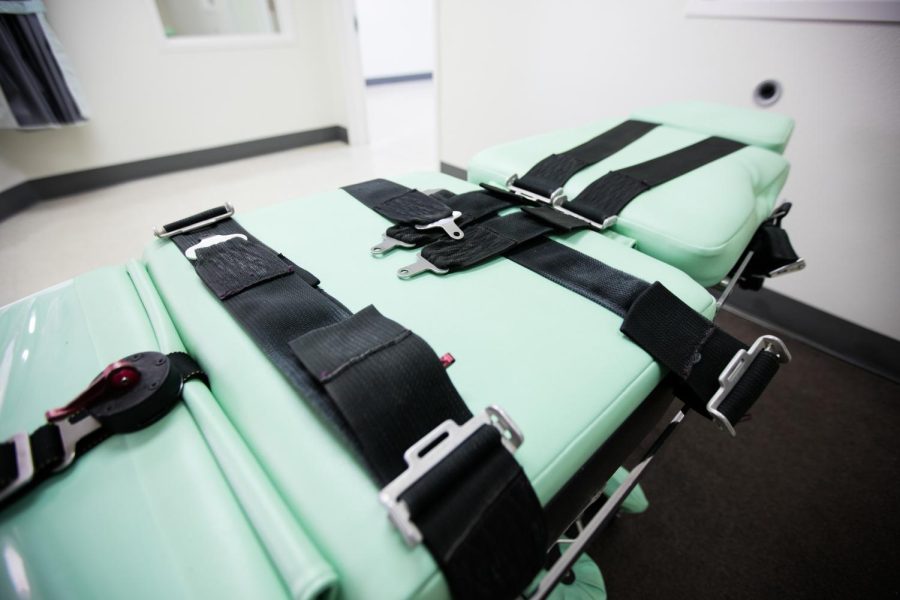Executions should be humane, not cruel
March 20, 2023
The punishment should fit the crime. Crime and punishment act as the foundation of the U.S. justice system. Recently, the United States has crossed the line from fair consequences to cruel and unusual punishment.
Over the past five years, hundreds of death row inmates filed lawsuits against Southern states due to illegal execution practices. States like Mississippi, Oklahoma and Alabama executed inmates using expired medications or inadequate medical equipment. The incompetence of state officials resulted in the needless torture of prisoners.
These botched executions consisted of hours of officials treating inmates as living science experiments. State officials continuously jabbed, drugged and prodded prisoners in hopes of killing them. What should have been a quick and painless execution now rivals the cruelty of medieval torture.
Whether you support or oppose the death penalty, botched executions should not occur in the United States of America. These actions violate the fundamental values of the Constitution, including government protection from cruel and unusual punishment.
The Eighth Amendment outlaws the infliction of cruel and unusual punishment on American citizens. The Founding Fathers hoped to prohibit the barbaric torture methods we read about in history textbooks. But the Constitution fails to properly define cruel and unusual punishment, leaving the amendment up to interpretation.
The Supreme Court constantly deliberates and argues whether the death penalty qualifies as cruel and unusual punishment. The Supreme Court’s ruling in Furman v. Georgia determined that states used the death penalty as a means of cruel and unusual punishment. The Supreme Court agreed that capital punishment should be used to deter future criminals, not to torment inmates currently on death row.
Sadly, that is not the case in many Southern states. According to the Death Penalty Information Center, Southern states have the highest percentages of executions when researchers examined state populations. Louisiana ranked No. 11, with 28 inmates put to death since 1976. For a state with a population of about 5 million, this number seems reasonable. However, larger states such as Pennsylvania have only executed three inmates in the last 60 years. As a result, Southern states are more likely to botch future executions.
The death penalty remains a source of contention in the United States. According to a 2022 Gallup poll, 55% of Americans support the death penalty as a form of punishment for murderers. While this number has dropped over the last decade, the death penalty still faces little opposition from the public.
Yet, many Americans have not witnessed the horrors that occur behind the closed doors of execution chambers. Reports of botched executions have finally brought awareness to issues surrounding the death penalty.
The inhumane treatment prisoners face is not the only problem. These botched executions do not just cost lives—each costs millions in taxpayer dollars.
Amnesty International USA reports that capital punishment costs each state around $1.26 million in legal fees, appeals and necessary equipment. For trials that resulted in life sentences, the average cost equaled about $700,000. While many think that putting an inmate to death saves taxpayer dollars, the reality is much bleaker.
The medications needed to perform a lethal injection contribute greatly to the cost of an execution. The high demand for these fatal, painless drugs resulted in a short supply. Now many states have reverted to using outdated medications that are often unsuccessful in humanely killing a prisoner. The shortage of lethal medications and abundance of botched executions caused multiple stays of moratorium headed by the Department of Justice.
Attorney General Merrick Garland issued a nationwide stay on federal executions, so the DOJ could conduct a review of each state’s methods of capital punishment. He argues that the death penalty will only remain legal if state officials follow proper protocol.
“The Department of Justice must ensure that everyone in the federal criminal justice system is not only afforded the rights guaranteed by the Constitution and laws of the United States but is also treated fairly and humanely,” Attorney General Garland said. “That obligation has special forces in capital cases.”
The DOJ should work with states that lack access to the medications used in executions. Each state’s Department of Corrections must pay millions of dollars to provide death row inmates with a swift and painless death. The DOJ should share that burden, covering some of the financial expenses.
Drug companies manufacturing lethal injections need to communicate with states. Both should work together, ensuring that state officials have the medication by the date of the execution.
When prisoners are sentenced to capital punishment, the U.S. needs to ensure that the punishment will not become worse than the crime.










Dudley Sharp • Mar 21, 2023 at 7:26 pm
The last statement in the article is, truly, foul and the author seems clueless. Speak to a parent that has lost a child to rape/murder.
My guess is that Zoe has not fact checked nor vetted the alleged “botched” executions nor any of the death penalty cost studies.
Give it a try:
Rebuttal: Botched Executions
and
Saving Costs with The Death Penalty
both at prodpinnc(DOT)blogspot(DOT)com
Dani • Mar 22, 2023 at 10:04 pm
While I agree with Ms. Sissac that our nation should not perpetrate violently cruel end of life for those sentenced to death, I appreciate your engaging in this very old debate. Of particular note for me, is the point the writer makes that the most recent horrors of capital punishment are at the hands of Southern states. We keep coming up in all the negative ways: poverty, infant mortality, illiteracy. If we agree as voters and taxpayers to continue the death penalty to bring justice to those who’ve committed atrocious crimes against us, for my tax dollars and my soul, I hope we will not become equal to the ones we would slaughter.
Dudley Sharp • Mar 30, 2023 at 6:31 pm
Dani:
You think murderers who rape and murder children are equivalent to those jurors who use legal due process to determine the most just sanction for that rapist murderer.
Do you think kidnapping and incarceration are equal, that theft and fines are equal, that slavery and community service are equal, that crime and justice are equal?
Do you?
If so, which it seems you must, why and how?
Dudley Sharp • Mar 30, 2023 at 6:41 pm
Dani”
You write:
“While I agree with Ms. Sissac that our nation should not perpetrate violently cruel end of life for those sentenced to death,”
You have presumed that Ms. Sissac fact checked the “botched” executions. She did not.
I provided the fact checking. Please review.
Dani • Apr 4, 2023 at 7:37 am
Mr. Sharp,
I did review your evidence and thank you for your thorough and long history of working to provide the other side of this issue. The research you cite, as well as your CV, evidence your passion for this topic.